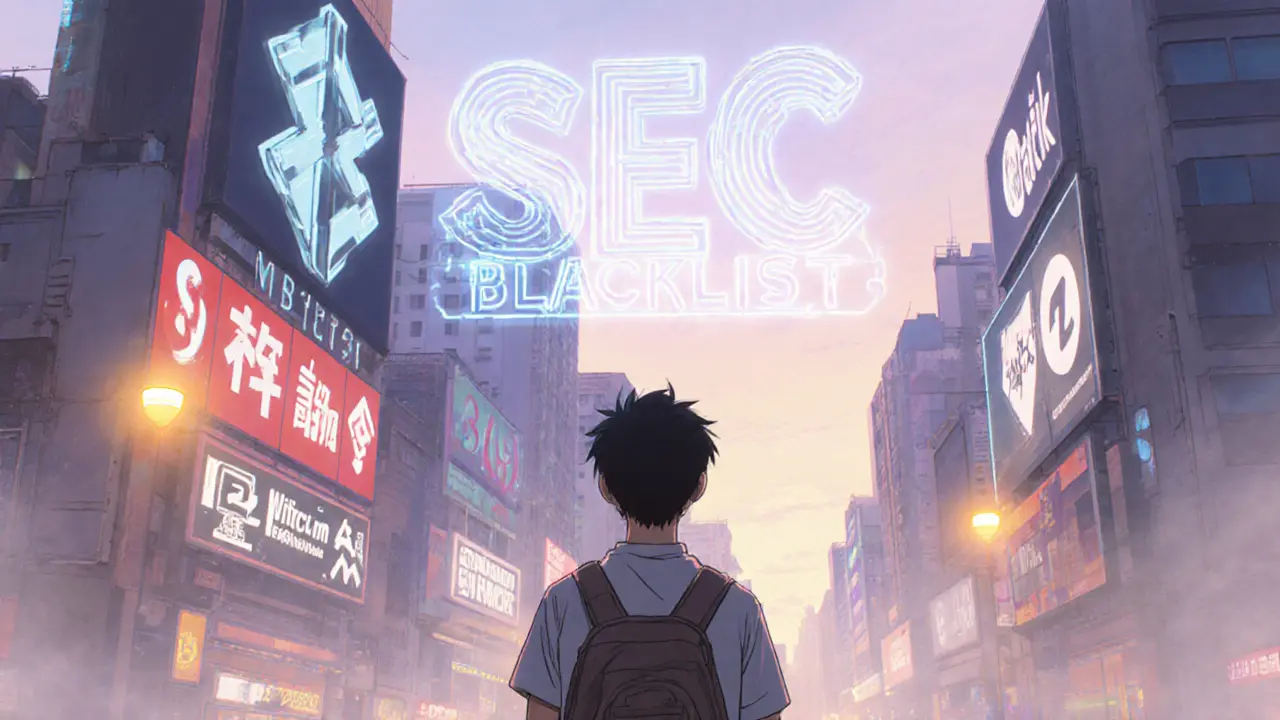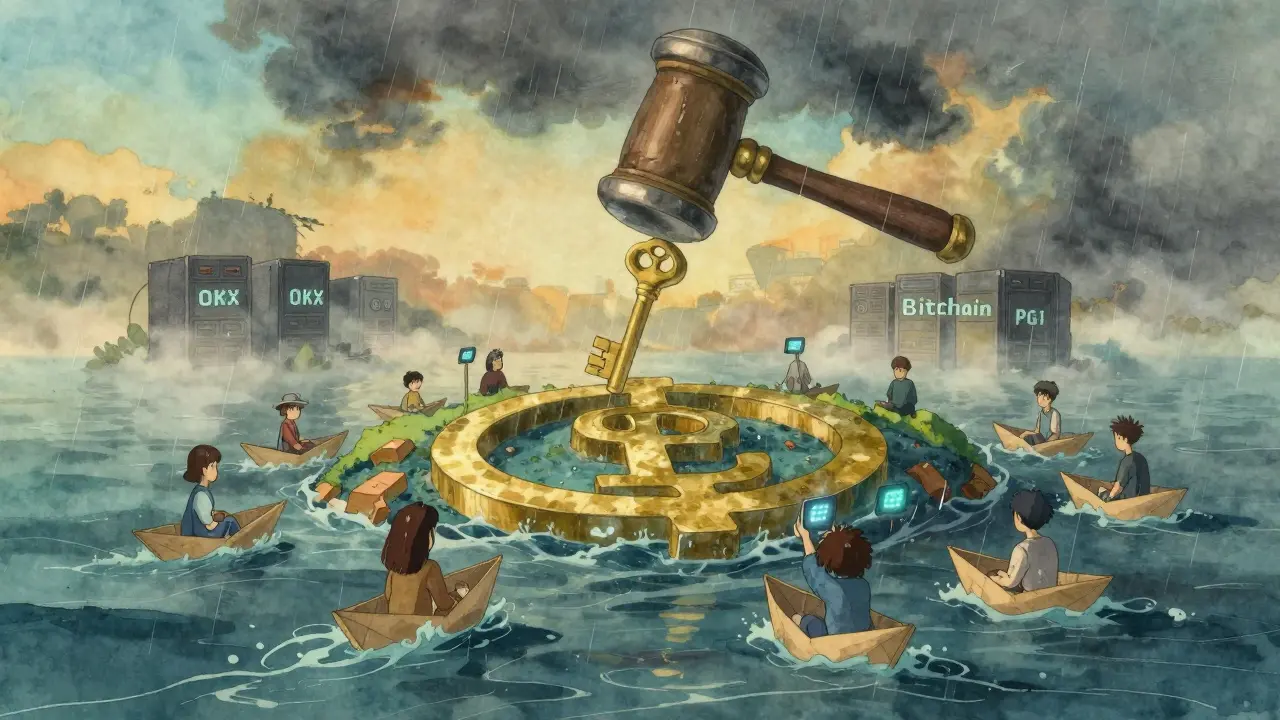Philippine Crypto Exchange Compliance Checker
Check Exchange Compliance Status
Enter the name of a crypto exchange to verify if it's compliant with Philippine SEC regulations as of August 2025.
Blacklisted Exchanges (2025)
These exchanges are currently blacklisted by the Philippine SEC due to non-compliance with CASP regulations.
Compliant Exchanges (2025)
These exchanges meet all Philippine SEC requirements for operating in the country.
Key Takeaways
- The Philippines SEC issued two rounds of blacklists in 2025, flagging fifteen major crypto exchanges for operating without a local license.
- New CASP rules require a ₱100million capital base, a physical office in the Philippines, and monthly financial reporting.
- Internet service providers have begun blocking access to non‑compliant platforms; users must either switch to licensed exchanges or use a VPN.
- Penalties range from ₱50,000 to ₱10million per violation, plus daily fines for continued breaches.
- Regional regulators in Thailand and Indonesia are adopting similar measures, signaling a broader Southeast Asian push for tighter crypto oversight.
On August12025 the Philippines Securities and Exchange Commission (SEC) the government agency that regulates securities and digital assets in the Philippines released a public advisory that named ten global crypto exchanges as non‑compliant with the country’s freshly minted Crypto Asset Service Provider (CASP) framework. Just weeks later, on August252025, the list grew to fifteen platforms. The move marks the most aggressive enforcement action since the SEC blocked Binance in 2024, and it reshapes how Filipino traders can access crypto markets.
Why the SEC Rolled Out a New Crypto Framework
In May2025 the SEC issued Memorandum Circular No.4 and No.5, establishing the Philippines’ first comprehensive CASP regime. The circulars aim to protect investors from loss, fraud, and market manipulation while giving the regulator clear tools to supervise foreign platforms that target Filipino users. Key provisions include:
- Mandatory registration of any crypto‑related service provider as a domestic corporation.
- A minimum paid‑in capital of ₱100million (about US$1.8million).
- Requirement to maintain a physical office within the Philippines.
- Monthly submission of audited financial statements to the SEC.
- Segregation of customer funds from the company’s operating capital.
- Penalties for violations ranging from ₱50,000 to ₱10million per infraction, plus daily fines of ₱10,000 until compliance.
The SEC says the rules are not a ban on crypto trading itself, but a “responsible regulatory environment” designed to safeguard the growing number of Filipino investors.
Timeline of the 2025 Blacklist Enforcement
- July52025 - Effective date of the new CASP requirements.
- August12025 - First advisory listing ten exchanges: OKX, Bybit, KuCoin, Kraken, MEXC, Bitget, CoinEx, Phemex, BitMart, Poloniex.
- August72025 - Major ISPs (PLDT, Globe Telecom) begin blocking URLs associated with the blacklisted platforms.
- August142025 - SEC clarifies that crypto trading is still allowed, but only through licensed providers.
- August252025 - Second advisory adds Blofin, CoinW, DigiFinex, LBank, Pionex, bringing the total to fifteen.
Each step shows a coordinated effort between the regulator, telecom infrastructure, and law‑enforcement agencies to enforce compliance quickly.

Blacklisted Exchanges at a Glance
| Exchange | Blacklisted? | Main Reason for Listing | Local Presence |
|---|---|---|---|
| OKX a top‑three global crypto exchange by volume | Yes | No SEC registration, no Philippine office | None |
| Bybit | Yes | Fails capital and reporting requirements | None |
| KuCoin | Yes | Lacks local licensing | None |
| Kraken | Yes | Did not establish a Philippine subsidiary | None |
| MEXC | Yes | Insufficient capital | None |
| Bitget | Yes | No compliance reporting | None |
| CoinEx | Yes | Non‑segregated customer funds | None |
| Phemex | Yes | Missing registration | None |
| BitMart | Yes | Fails capital threshold | None |
| Poloniex | Yes | Lack of local office | None |
| Blofin | Yes | Unregistered | None |
| CoinW | Yes | No compliance filings | None |
| DigiFinex | Yes | Capital shortfall | None |
| LBank | Yes | Missing Philippine entity | None |
| Pionex | Yes | No registration, no office | None |
| Binance Philippines | No | Operates through a locally licensed subsidiary | Manila office |
| Coins.ph | No | Fully compliant with SEC circulars | Manila office |
The table shows that every listed platform either lacked a registered Philippine corporation, failed the ₱100million capital test, or did not provide the required monthly reports. Only a few local players-such as Binance’s Philippine subsidiary and Coins.ph-meet the new standards.
How the New Rules Affect Everyday Traders
For a typical Filipino crypto enthusiast, the crackdown translates into three practical outcomes:
- Access Blockage - When you type the URL of a blacklisted exchange, your ISP redirects you to a notice page explaining the regulatory violation.
- Migration Pressure - To keep trading without a VPN, you’ll need to open an account on a compliant platform that has a local office and meets the capital requirement.
- Increased Costs - Licensed exchanges may raise fees to cover the extra compliance overhead, which could shave a few basis points off your trades.
That said, the SEC’s August14 advisory reassures users that they can still buy, sell, and hold crypto assets; the restriction is strictly on the service providers, not the asset class itself.
Enforcement Mechanics: From Advisory to ISP Blockade
The SEC’s approach blends legal threat with technical enforcement. After publishing an advisory, the commission forwards the list to the National Telecommunications Commission (NTC), which then instructs major ISPs-most notably PLDT and Globe Telecom-to block DNS resolution for the offending domains. Users who try to reach a blocked site see a landing page stating, “This website is restricted due to non‑compliance with SEC regulations.”
Violators face a tiered penalty structure:
- First‑time infractions: ₱50,000 fine.
- Repeated or systemic violations: up to ₱10million per breach.
- Ongoing non‑compliance after a notice: ₱10,000 per day.
These fines are levied on the corporate entity, not individual traders, but the reputational damage can drive users away fast.
Regional Ripple Effects: Southeast Asia Tightens Its Grip
The Philippines isn’t acting in a vacuum. In May2025, Thailand’s SEC ordered the blocking of five exchanges-including Bybit and OKX-citing anti‑money‑laundering concerns. Meanwhile, Indonesia’s tax authority raised the income tax on offshore crypto trades from 0.2% to 1%, and amplified the tax on domestic platforms to 0.21%.
These coordinated moves suggest a regional consensus: regulators want to bring offshore crypto activity under national oversight, protect local investors, and collect revenue. For crypto firms, the message is clear-if you want to serve Southeast Asian users, you must set up a proper legal entity, meet capital thresholds, and submit regular reports.

What Traders Can Do Right Now
If you’re caught between a blacklisted exchange and the desire to keep trading, here are actionable steps:
- Verify Compliance - Check the SEC’s official advisory page for the latest list of approved exchanges.
- Transfer Funds Safely - Use the 90‑day exit window (similar to the Binance case) to move assets to a compliant wallet or exchange.
- Consider Local Alternatives - Platforms like Coins.ph, PDAX, and the Philippine‑licensed arm of Binance offer the same major coins with lower friction.
- Secure a VPN Only as a Backup - While a VPN restores access, it’s a temporary fix and may violate the exchange’s terms of service.
- Stay Informed - Follow the SEC’s social media channels or subscribe to their mailing list for any updates on additional blacklists.
By acting fast, you can avoid the daily penalty fees that the SEC imposes on platforms still serving Filipino users without registration.
Future Outlook: Will More Exchanges Get Blacklisted?
The SEC warned that any platform “designed to onboard Philippine users without registration shall likewise be considered in violation.” That open‑ended phrasing hints at possible expansions of the list, especially as new DeFi aggregators and derivatives apps launch.
Analysts expect two scenarios:
- Compliance Wave - Larger exchanges may open Philippine subsidiaries, raise capital, and meet reporting requirements, turning the blacklist into a temporary hurdle.
- Underground Shift - Users frustrated by limited choices could migrate to peer‑to‑peer (P2P) marketplaces or decentralized exchanges (DEXs) that operate outside the SEC’s jurisdiction.
Either way, the regulatory environment is set to stay firm. For traders, the safest bet is to anchor activity with a licensed provider that can weather future policy changes.
Frequently Asked Questions
Which crypto exchanges are currently allowed in the Philippines?
Only exchanges that have registered as domestic corporations, posted a ₱100million capital, maintain a physical office, and submit monthly financial statements to the SEC are permitted. As of August2025, Binance Philippines, Coins.ph, and PDAX are compliant.
Can I still use a VPN to access a blacklisted exchange?
Technically, yes-a VPN can bypass ISP-level blocking. However, the exchange may consider this a breach of its terms, and you remain exposed to regulatory risk if the SEC expands the blacklist.
What penalties does the SEC impose on non‑compliant exchanges?
Fines start at ₱50,000 per violation and can reach up to ₱10million for severe breaches. Ongoing violations incur a daily fine of ₱10,000 until the platform complies.
How does the Philippines’ approach compare to Thailand’s crypto regulations?
Both countries issued circulars that require local registration and capital thresholds. Thailand also emphasizes anti‑money‑laundering controls and blocked five exchanges in May2025, mirroring the Philippines’ ISP‑level enforcement.
What should I do with assets on a blacklisted exchange?
Initiate a withdrawal to a personal wallet or move them to a compliant exchange within the 90‑day exit window that the SEC typically provides after a blacklist announcement.
Next Steps for the Crypto Community
Regulators are sending a clear signal: operating in the Philippines now demands the same level of corporate rigor as any traditional financial service. For developers, this means building compliance APIs that can generate the required monthly reports. For investors, it means vetting any platform’s SEC registration number before committing funds.
Stay alert, keep documentation handy, and consider diversifying across multiple licensed providers to avoid a single point of failure. The tighter rules may feel restrictive today, but they also lay the groundwork for a more stable and trustworthy crypto ecosystem in the long run.







Annie McCullough
October 10, 2025 AT 08:21Liquidity pools are just a hype loop that masks the underlying regulatory arbitrage 📊
Carol Fisher
October 10, 2025 AT 11:07Our financial sovereignty must not be compromised by offshore platforms that sidestep Filipino law 🇵🇭💪
Hanna Regehr
October 10, 2025 AT 13:54The SEC’s capital threshold forces exchanges to prove they can actually cover user deposits, which is a solid investor protection step.
At the same time, the requirement for a physical Manila office adds a tangible accountability layer.
Traders should prioritize platforms that publish audited statements each month – transparency beats anonymity every time.
That said, higher compliance costs will likely be reflected in slightly wider spreads, so keep an eye on fee schedules.
Overall, the move nudges the market toward maturity without outright banning crypto.
Ben Parker
October 10, 2025 AT 16:41Just moved my whole portfolio to a compliant exchange and the checkout felt smoother than my last coffee order ☕️🚀
Anjali Govind
October 10, 2025 AT 19:27It’s interesting how the ISP blocking actually pushes users to learn about local licensing – a side‑effect that could improve crypto literacy across the Philippines.
Sanjay Lago
October 10, 2025 AT 22:14Guys, don’t panic – just shift your assets to a local compliant platform and you’ll be fine, trust me! 😊
Those fees might look a lil higher but it’s worth the safety net.
arnab nath
October 11, 2025 AT 01:01The blacklist is just a pretext for a hidden agenda.
Orlando Lucas
October 11, 2025 AT 03:47Regulation, at its core, is an attempt to align the incentives of market participants with the broader social contract; when a regulator imposes capital adequacy, it is signaling that the protection of user funds supersedes the allure of unchecked growth.
In the Philippines, the ₱100 million threshold is not merely a number but a benchmark that differentiates serious institutional players from fleeting hobbyist platforms.
Physical presence in Manila serves a dual purpose: it creates a jurisdictional anchor and provides a tangible point of recourse for disgruntled users.
The monthly audited statements act as a transparency mechanism, enabling the SEC to monitor systemic risk indicators in near real‑time.
For traders, these measures collectively reduce the probability of sudden exchange collapses, which have plagued less regulated markets worldwide.
However, compliance is not without cost; operational overheads will likely translate into modest fee hikes, an inevitable trade‑off for heightened security.
Yet, the long‑term stability afforded by a regulated environment can foster greater institutional participation, leading to deeper liquidity pools.
DeFi protocols may feel the squeeze, but they can adapt by partnering with licensed custodians to retain user access while meeting local rules.
Moreover, the collaboration between the SEC and ISPs demonstrates a coordinated enforcement model that can rapidly curtail illicit activity.
Blocking DNS resolution is a low‑cost, high‑impact tool that effectively cuts off traffic to non‑compliant services without requiring extensive legal proceedings.
Such technical enforcement underscores the regulator’s willingness to leverage existing infrastructure for policy implementation.
From a macro perspective, this could serve as a blueprint for other Southeast Asian nations seeking to harmonize crypto oversight.
As regional regulators converge on similar capital and licensing standards, cross‑border interoperability will improve, reducing arbitrage opportunities for illicit actors.
Ultimately, traders who embrace compliant platforms will benefit from a more resilient ecosystem, while those who cling to blacklisted services may face escalating barriers, both technical and legal.
In this evolving landscape, vigilance and adaptability are the hallmarks of successful crypto participants.
Philip Smart
October 11, 2025 AT 06:34Looks like the SEC finally decided to stop pretending crypto is the Wild West – guess they’re tired of the chaos.
Jacob Moore
October 11, 2025 AT 09:21Good call on moving to a licensed exchange; keep an eye on the fee schedule and make sure the platform offers 2FA for added security.
Manas Patil
October 11, 2025 AT 12:07From a cultural standpoint, the push for local licensing resonates with the Filipino spirit of community accountability – having a Manila office means the exchange can be held to local consumer protection standards, which is crucial for widespread adoption.
Melanie Birt
October 11, 2025 AT 14:54Make sure you verify the SEC registration number on the exchange’s website before depositing – it’s the fastest way to confirm compliance 😊
Lady Celeste
October 11, 2025 AT 17:41Another regulatory drama, same old story.
Ethan Chambers
October 11, 2025 AT 20:27One must wonder whether this regulatory flourish is genuine consumer protection or merely a performative gesture to placate international watchdogs, a classic case of style over substance.
gayle Smith
October 11, 2025 AT 23:14The SEC’s crackdown is just the latest episode in the high‑stakes drama of crypto governance – the intrigue never ends.
Nathan Van Myall
October 12, 2025 AT 02:01Check the official SEC advisory page regularly to stay up‑to‑date on any changes to the compliant exchange list.
Brandon Salemi
October 12, 2025 AT 04:47Bottom line: move to a licensed platform now and avoid the hassle of ISP blocks.